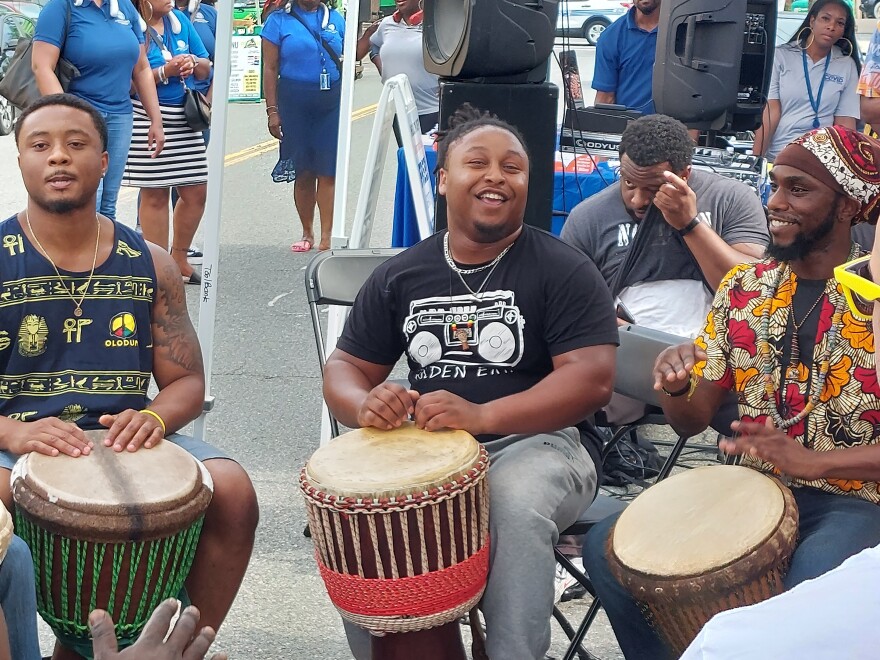Crowds filled the streets of Plaza Midwood this weekend for the Juneteenth of the Carolinas’ 25th annual festival. It came on the second year the holiday has been recognized by the federal government.
Juneteenth recognizes the importance of June 19, 1865, when enslaved people in Galveston, Texas, first found out they were freed in the Emancipation Proclation.
Those enslaved people found out about their freedom 2.5 years after Abraham Lincoln first made the proclamation.
“Our aim is not to recreate the past. But to share in the spirit of freedom and togetherness. That’s what Juneteenth of the Carolina’s is about,” Juneteenth of the Carolina’s founder Pape Ndiaye said.
Ndiaye started Juneteenth of the Carolinas in Plaza Midwood neighborhood 25 years ago, outside his shop, House of Africa. At that time, many people didn’t even know what Juneteenth was.
For instance, Walter Nelson did not know about Juneteenth until Ndiaye taught him about it almost 25 years ago. Ndiaye was new to America when they first met. It was very soon after Ndiaye first moved to America from Senegal.
“He – actually him being from Senegal – schooled, me, a native of Charlotte, and made me aware of what Juneteenth was all about,” Nelson said. “From that, he planted the seed here in Charlotte, and we've seen how it's flourishing.”
Since then, Nelson and his wife Mildrid have attended the festival every single year.
Seven years after the first Juneteenth here in Charlotte, Ndiaye moved the event to Independence Park, Ndiaye said. But another seven years later, construction started at the park. Because of that, they moved the event back to the House of Africa, Ndiaye said, where the festival has been for the past ten years.
The festival has included another component during the past two years: a march and parade.
However, organizers like march coordinator Shawn Manuel emphasize that it is a unity march. It isn’t a protest.
“A march is just to say, 'hey, listen, we're here. This is how we got here. While we're here, we're going to celebrate who we are and where we came from,'” Manuel said. “So it's not a protest.”
Despite Juneteenth’s connection to slavery, for many at the festival, the holiday is more oriented around celebrating freedom. Isayah Beloved Shalom has been celebrating at the festival for 23 years and he says there’s no better thing than celebrating people’s freedom.
“There is such a stigma and such a negative past associated with slavery, which it should be,” Shalom said. “But freedom should be a celebration.”
Sheldon McIver agrees. Many people know of him as Retro. He’s president of the Kingdom Alignment, a motorcycle ministry out of Greensboro.
“Slavery happened. There's nothing we can do about it happened. And all we can do is live in a way that it doesn't come back,” McIver said. “However, Juneteenth, again, is a celebration. Not to say, ‘Hey, look, we were enslaved for all these years,’ but to let folks know, ‘look, we are free from what we were once in bondage to.’”
McIver points to many of the businesses and entrepreneurs that line the street of the festival outside of House of Africa. He says that it shows what Black people can do with their freedom, despite negative stereotypes and messaging many young Black kids see.
“Because there are some people who don't realize that they're free and so they're still going about life the same old way,” McIver said. “But when you see this representation of power, strength, unity and love, it lets them know that if they can be happy, if they can thrive, so can I. It represents opportunity.”
Many at the Juneteenth festival also focus on connecting with their history and heritage. The Unity March coordinator Manuel is one of them:
“We celebrate so many cultures in this country. Let us celebrate the fact that we are here, too, and that we are part of America at this point. So we're Americans. We're Black Americans, but we're here. We have a history as well.”
Ndiaye says that it is good for people to celebrate and have a good time at the Juneteenth festival. But it is also important not to lose sight of the importance of the history Juneteenth is remembering.
“We just don’t want people to come just for the fun of it,” Ndiaye said. “But to learn something about culture, heritage and take it home.”
At the festival, many aspects of that heritage are on full display. The festival features African dancers along with drum circles and storytellers. But the event also features a variety of sessions focusing on the past like a celebration of history and a heritage hour.
Organizers hope the increased visibility from the federal holiday designation will bring more people out to the festival. Plus, many attendees and organizers think it's important for people of all backgrounds to come down.
“I don't think there should be fear attached to it,” Shalom said. “I think they should be happy that we are free and show that by celebrating with us.”
Ndiaye also emphasizes that Juneteenth should be celebrated by everyone, not just Black people.
“Juneteenth is not just an African American holiday,” Ndiaye said. “It’s a piece of American history so we all have to celebrate.”
Across Charlotte, there were other Juneteenth celebrations too like Juneteenth Jam, Durag Fest, and Juneteenth on the Corridor on Charlotte’s west side.

